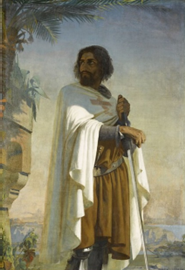
By: James D. Lamb, REGC
Good Sir Knights of the New Mexico Division!
My year as your Grand Commander is quickly coming to an end. Please remember that it is the duty of all Sir Knights that are elected in constituent commanderies and all Grand officers to attend the Grand Sessions. I have been informed that the registrations website is on-line, and payment can be made in several ways, to include PayPal. The Grand Sessions Committee has worked had to bring you a comprehensive session at a reasonable cost. I would also like to have as many Sir Knights attend the Holy Land Pilgrimage dinner as possible.
This supplement may be rather short as I am diligently working on my allocution for your review. I will continue to bring you as much information as I can in the coming months. Until then, please enjoy this article I found on Hugues de Payens, a Knight Templar born on February 9, 1070.

Hugues de Payens was born on 9 February 1070 and was the co-founder and first Grand Master of the Knights Templar. In association with Bernard of Clairvaux, he created the Latin Rule, the code of behavior for the Order. It is also known as the “Specific Behavior for the Templar Order”. It outlines 72 clauses as the ideal behavior of a knight. The rule borrowed from the rule of Saint Augustine but was mostly inspired by the rule of Saint Benedict. It was, however, adapted for use by active, primarily military, knights, rather than cloistered monks. For example, the fasts were less severe so that they did not interfere with combat.
As Grand Master, Hugues de Payens led the Order for almost twenty years until his death, helping to establish the Order’s foundations as an important and influential military and financial institution. On his visit to England and Scotland in 1128, he raised men and money for the Order, and also founded their first House in London and another near Edinburgh at Balantrodoch, now known as Temple, Midlothian. The Latin Rule laying down the way of life of the Order, attributed to Hugues de Payens and Bernard of Clairvaux, was confirmed in 1129 at the Council of Troyes over which Pope Honorius II presided. Hugues de Payens died in 1136. The circumstances and date of his death are not recorded in any chronicle, though the Templars commemorated him every year on 24 May, and it’s presumed he died of old age.
Please check into this article, especially the “Latin Rule”, it is a good read. Until then, be well Sir Knights!
James D. Lamb, REGC
